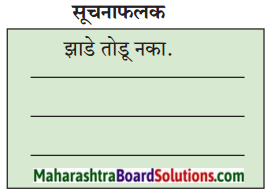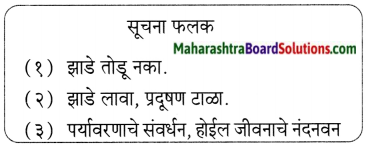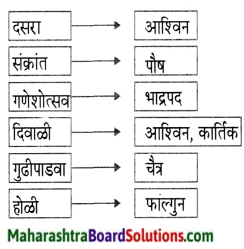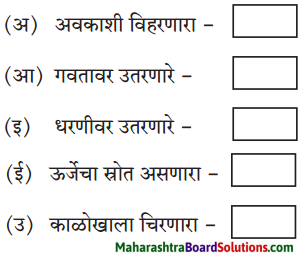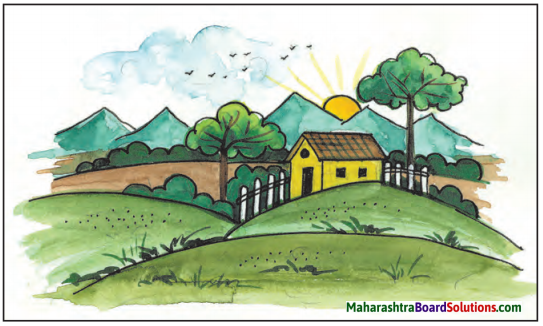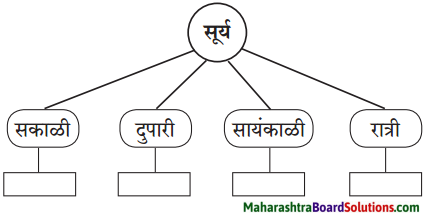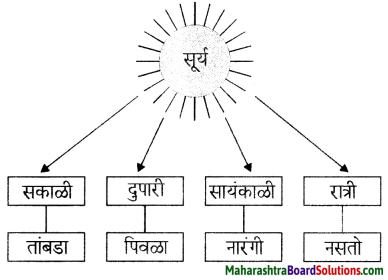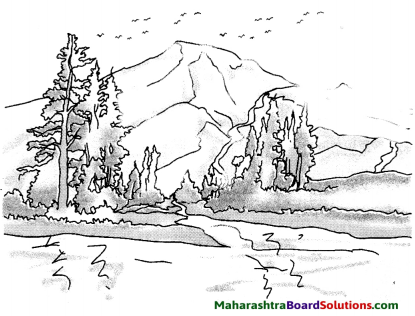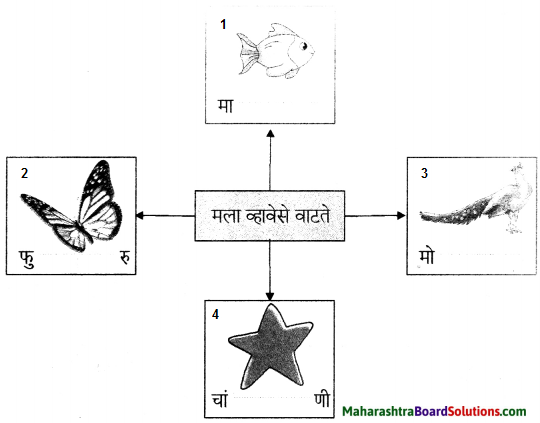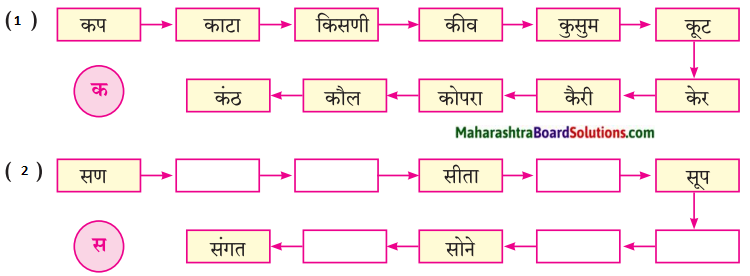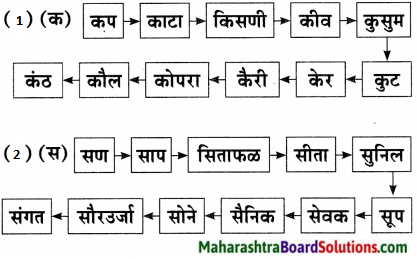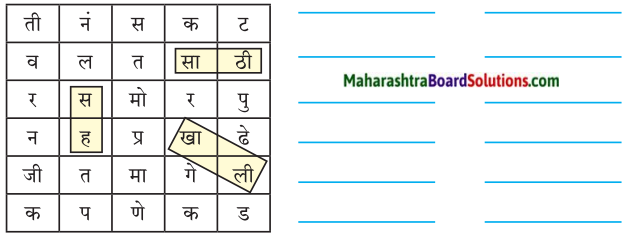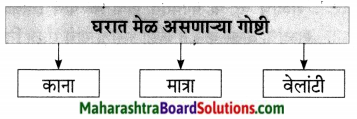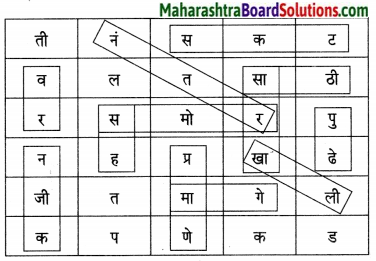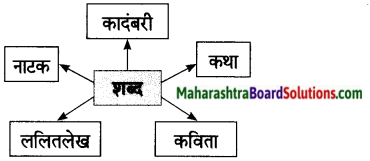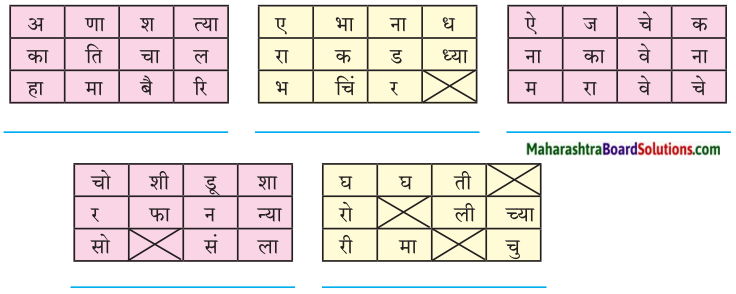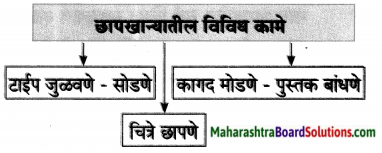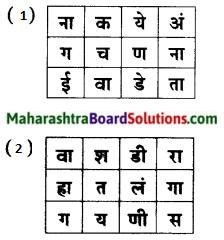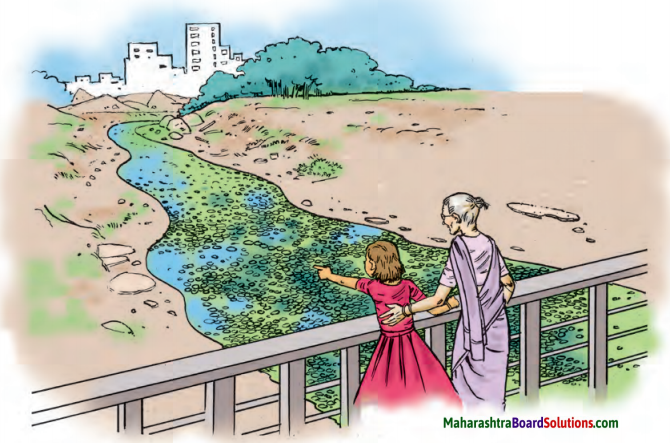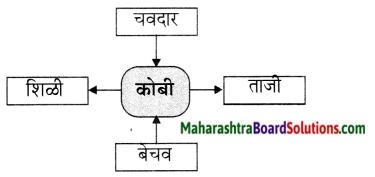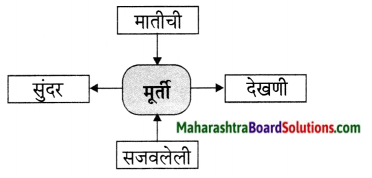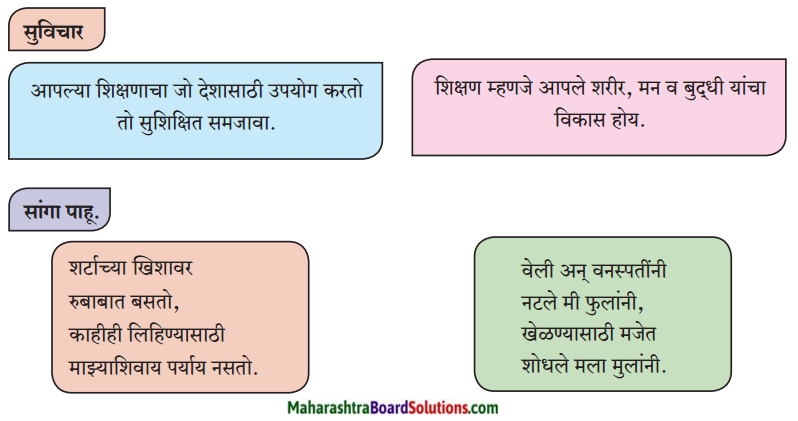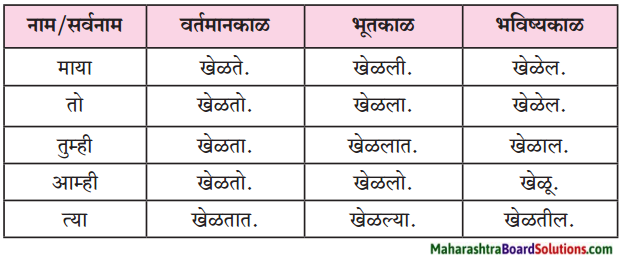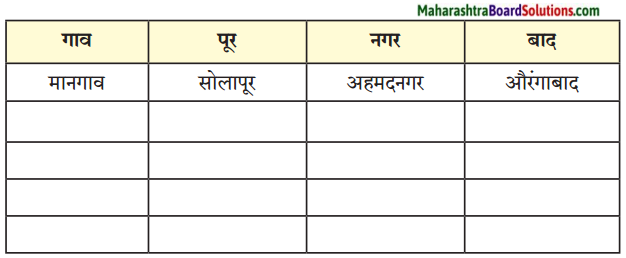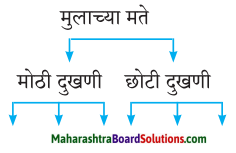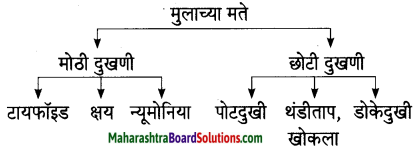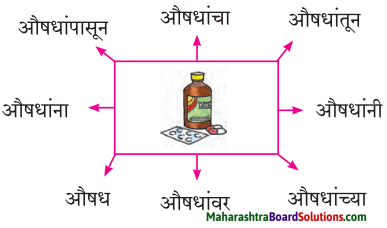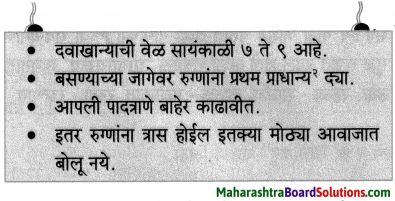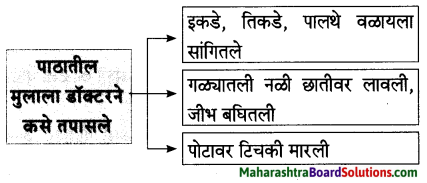Balbharti Maharashtra State Board Class 7 Marathi Solutions Sulabhbharati Chapter 13 अदलाबदल Notes, Textbook Exercise Important Questions and Answers.
Class 7th Marathi Chapter 13 अदलाबदल Question Answer Maharashtra Board
Std 7 Marathi Chapter 13 Question Answer
Marathi Sulabhbharti Class 7 Solutions Chapter 13 अदलाबदल Textbook Questions and Answers
1. खालील आकृती पूर्ण करा.
प्रश्न 1.
अमृत व इसाब यांच्यामध्ये सारख्या असणाऱ्या गोष्टी.

उत्तरः
- कपड्याचा रंग
- कपड्याचा आकार
- शर्टाचे कापड
- शाळा
- वर्ग
- रस्त्याच्या कोपऱ्यावर समोरासमोर घरे.
![]()
2. खाली दिलेल्या वाक्यांचा योग्य घटनाक्रम लिहा.
प्रश्न अ.
एका व्रात्य मुलाला एक खोडकर कल्पना सुचली.
उत्तर:
गावातील काही मुले निंबाच्या झाडाखाली जमली होती.
प्रश्न आ.
अमृत व इसाबने शर्टाची अदलाबदल केली.
उत्तरः
एका व्रात्य मुलाला एक खोडकर कल्पना सुचली.
प्रश्न इ.
गावातील काही मुले निंबाच्या झाडाखाली जमली होती.
उत्तरः
अमृत व इसाबने शर्टाची अदलाबदल केली.
प्रश्न ई.
अमृत व इसाबच्या परस्परांवरील प्रेमाची गोष्ट ऐकून सर्व जण हेलावून गेले.
उत्तरः
हसनभाई काय सांगत आहेत ते ऐकायला शेजार-पाजारच्या बायकाही तिथे जमल्या.
![]()
प्रश्न उ.
हसनभाई काय सांगत आहेत ते ऐकायला शेजार पाजारच्या बायकाही तिथे जमल्या.
उत्तरः
अमृत व इसाबच्या परस्परांवरील प्रेमाची गोष्ट ऐकून सर्वजण हेलावून गेले.
3. पुढील वाक्यात कंसातील योग्य वाक्प्रचार लिहा.
- घरी आलेल्या पाहुण्यांना बाबांनी राहण्यासाठी ………………….. (गळ घातली, भुरळ घातली)
- बाळू नवीन छत्री कोठेतरी विसरून आला हे पाहून आईचा ………………………. (पारा चढला, कौतुक वाटले)
- रस्त्यावर भांडणाऱ्या कुत्र्यांच्या आवाजाने नीताच्या …………………. (पोटात कावळे ओरडले, पोटात गोळा आला)
- त्याची करुण कहाणी ऐकून सर्वांची मने …………………………. (हेलावून गेली, हबकून गेली)
उत्तरः
- गळ घातली
- पारा चढला
- पोटात गोळा आला
- हेलावून गेली
खेळूया शब्दांशी
प्रश्न अ.
खाली दिलेल्या ‘अ’ व ‘ब’ गटातील शब्दांच्या योग्य जोड्या जुळवा.
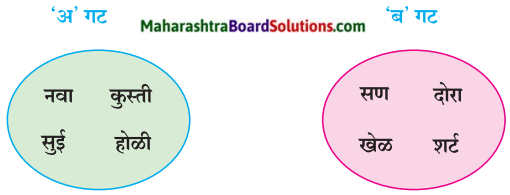
उत्तरः
- नवा – शर्ट
- कुस्ती – खेळ
- सुई – दोरा
- होळी – सण
- गंभीर – वळण
- निंब – झाड
![]()
प्रश्न आ.
खालील शब्दांतील अचूक शब्द लिहा.
अ. व्रात्य, वात्र्य, वार्त्य, वार्त्य
आ. कप्लना, कल्पना, कलपना, कल्पना
इ. गोष्ट, गोश्ट, गोशट, गोष्ट
उत्तरः
अ. व्रात्य
आ. कल्पना
इ. गोष्ट
प्रश्न इ.
खालील पहिल्या आकृतीत ‘वान’ हा प्रत्यय लावून तयार झालेले शब्द दिले आहेत. खाली दिलेले प्रत्यय लावून तयार होणारे शब्द लिहा.
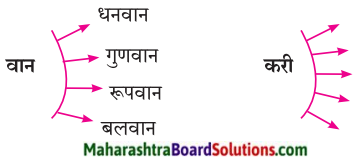
उत्तरः
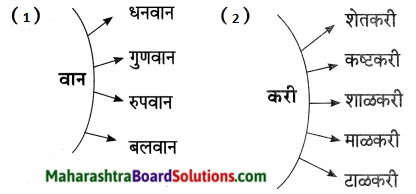
लिहिते होऊया
प्रश्न 1.
‘माझा आवडता मित्र/मैत्रीण’ या विषयावर थोडक्यात माहिती लिहा.
उत्तर:
माझ्या आवडत्या मैत्रीणीचे नाव जुई आहे. ती माझ्याच घराशेजारी राहत असून आम्ही एकाच वर्गात शिकतो. लहानपणापासूनच एकत्र वाढल्यामुळे आम्ही एकमेकींच्या सर्व गोष्टी जाणून आहोत. शाळेतील अभ्यास आम्ही एकत्रच करतो. आमच्या आवडीनिवडीही बऱ्याचशा सारख्याच आहेत. ती फक्त माझी मैत्रीण नसून आमच्या घरातील एक सदस्य आहे.
![]()
प्रश्न 2.
सुट्टीच्या दिवशी मित्रांसोबत तुम्ही कोण-कोणते खेळ खेळता?
उत्तरः
सुट्टीच्या दिवशी मित्रांसोबत मी क्रिकेट, खो-खो, कबड्डी, बॅटमिंटन असे खेळ खेळतो. तसेच कॅरम, बुद्धिबळ, टेबल टेनिस असे घरी खेळता येण्यासारखे खेळही खेळतो.
प्रश्न 3.
तुमचा आवडता मित्र/मैत्रीण यांमधील तुम्हांला कोणते गुण सर्वांत जास्त आवडतात?
उत्तर:
मला माझ्या मैत्रीणीमधील अनेक गुण आवडतात. ती महत्त्वाकांक्षी आहे. तिची चिकाटी, एकाग्रता, दूरदृष्टी घेण्याच्या वृत्तीमुळे माझी मैत्रीण मला फार आवडते.
विचार करा. सांगा.
खालील प्रसंगी तुम्ही काय कराल?
प्रश्न 1.
तुमच्या मित्राने/मैत्रीणीने डबा आणला नाही.
उत्तर:
माझ्या मित्राने/मैत्रीणीने डबा आणला नसेल तर मी तिला माझ्या डब्यातला खाऊ खायला देईन.
![]()
प्रश्न 2.
शाळेत पिण्याच्या पाण्याचा नळ कुणीतरी विनाकारण’ सुरू ठेवला.
उत्तर:
पाण्याचा नळ सुरू असलेला पाहून मी तो तातडीने बंद करेन. तसेच पाणी वाया घालवू नये. अशी सूचना नळाच्या जवळ लावेन.
प्रश्न 3.
वर्गातील एका विद्यार्थ्याने वर्गात कचरा केला आहे व ते तुम्ही पाहिले.
उत्तरः
मी कचरा करणाऱ्या त्या विदयार्थ्यास तो कचरा उचलून कचराकुंडीत टाकण्यास सांगेन व त्याने तसेच इतरांनीही वर्गात कचरा करू नये अशी विनंती करेन.
प्रश्न 4.
सहलीत तुमचा मित्र किल्ल्याच्या भिंतीवर नावे लिहीत आहे.
उत्तर:
मी त्या मित्रास किल्ल्याच्या भिंतीवर नावे न लिहिण्याची विनंती करीन. पुरातन वास्तूंचे महत्त्व पटवून देईन.
खेळ खेळ्या
प्रश्न 1.
खाली काही शब्द दिले आहेत. त्या शब्दांचा समानार्थी शब्द भरून कोडे पूर्ण करा.
- मस्तक
- कचरा
- रात्र
- पाणी
- जनता
- मुलगी
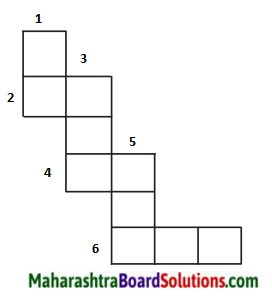
उत्तर:
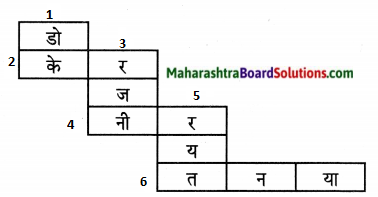
प्रश्न 2.
खाली काही शब्द दिले आहेत त्या शब्दांचा विरुद्धार्थी शब्द भरून कोडे पूर्ण करा.
- उदयोगी ×
- गरम ×
- मोठा ×
- जुने ×
- होकार ×
- हसणे ×
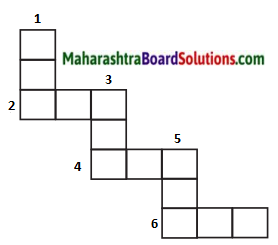
उत्तरः
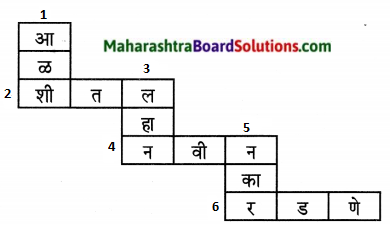
आपण समजून घेऊया.
प्रश्न 1.
खालील शब्द वाचा.
किडा, मेहुणा, पादुका, बाहुली, महिना, पहिली, सगुणा, तालुका, भिडू, पिसू, मनुका.
वरील शब्दांतील शेवटच्या दोन अक्षरांचे निरीक्षण करा. काय जाणवते?
या शब्दांतील शेवटच्या अक्षराला काना, मात्रा, वेलांटी, उकार असे बाराखडीतील कोणते ना कोणते तरी एक चिन्ह आहे आणि शेवटून दुसऱ्या अक्षरांतील इकार किंवा उकार हस्व आहेत.
![]()
लक्षात ठेवा:
मराठी शब्दातील शेवटचे अक्षर दीर्घ स्वरान्त असेल, तर त्या आधीच्या अक्षरातील (उपान्त्य अक्षरातील) इकार व उकार हस्व लिहितात.
तत्सम शब्दांतील उपान्त्य अक्षरे दीर्घ असतील, तर ती संस्कृतमधील मूळ शब्दांप्रमाणेच दीर्घ लिहावी.
उदा., क्रीडा, परीक्षा, लीला, संगीता, पूर्व, भीती.
Class 7 Marathi Chapter 13 अदलाबदल Additional Important Questions and Answers
खालील वाक्यांतील रिकाम्या जागा भरा.
प्रश्न 1.
- गावातील काही मुले … झाडाखाली जमली होती.
- दुसऱ्या एका …………. मुलाला एक कल्पना सुचली.
- नवा शर्ट घेऊन देण्यासाठी आईने ………… बाबांना गळ घातली.
- इसाबला हे सहन झाले नाही. त्याचा .. .चढला.
- इसाबने ………… घालून केशवला ……….. “केले.
- तो होळीचा दिवस होता. या दिवशी …………… घेणार हे ठरलेलेच असते.
- इसाबचे बाबा अंगणात …………. बसले होते.
उत्तर:
- निंबाच्या
- व्रात्य, खोडकर
- अमृतच्या
- पारा
- पेच, चीत
- झोंबाझोंबी
- खाटेवर
![]()
खालील प्रश्नांची एक ते दोन वाक्यांत उत्तरे लिहा.
प्रश्न 1.
कोणाची घट्ट मैत्री होती?
उत्तरः
अमृत व इसाब या दोघांची घट्ट मैत्री होती.
प्रश्न 2.
अमृतला जमिनीवर कोणी ढकलले?
उत्तरः
केशवने अमृतला जमिनीवर ढकलले.
प्रश्न 3.
इसाबचा पारा का चढला?
उत्तर:
केशवने अमृतला जमिनीवर ढकलताच बाकीची पोरे “अमृत हरला, केशव जिंकला!” असे ओरडू लागली हे इसाबला सहन झाले नाही व त्याचा पारा चढला.
प्रश्न 4.
अमृत व इसाबचे पाय जमिनीला का खिळले?
उत्तर:
केशव व इसाबच्या मारामारीत इसाबच्या शर्टाचा खिसा फाटला ते पाहून भीतीने दोघांचे पाय जमिनीला खिळले.
![]()
प्रश्न 5.
इसाबच्या वडीलांचे नाव काय होते?
उत्तर:
इसाबच्या वडीलांचे नाव हसनभाई होते.
प्रश्न 6.
इसाबच्या वडीलांनी इसाबच्या शर्टासाठी काय-काय केले होते?
उत्तर:
इसाबच्या वडीलांनी इसाबच्या शर्टासाठी सावकाराकडून पैसे कर्जाऊ घेतले होते. कापड निवडण्यात आणि शर्ट शिवून घेण्यात खूप वेळही खर्ची घातला होता.
असे कोण कोणास म्हणाले ते लिहा.
प्रश्न 1.
“अरे, तुम्ही दोघे कुस्ती का नाही लढत?”
उत्तरः
एक व्रात्य मुलगा इसाब व अमृतला म्हणाला.
प्रश्न 2.
“आता जर का तू ते मळवलेस किंवा फाडलेस तर लक्षात ठेव”
उत्तरः
अमृतची आई अमृतला म्हणाली.
![]()
प्रश्न 3.
“चल ये, मी तुझ्याबरोबर कुस्ती लढतो.”
उत्तर:
इसाब केशवला म्हणाला.
प्रश्न 4.
“अरे, असे मित्रांपासून पळताय काय?”
उत्तरः
इसाबचे बाबा इसाब व अमृतला म्हणाले.
प्रश्न 5.
“भाभी, आजपासून तुमचा हा अमृत माझा मुलगा बरं का?”
उत्तरः
हसनभाई अमृतच्या आईला म्हणाले.
खालील प्रश्नांची थोडक्यात उत्तरे लिहा.
प्रश्न 1.
अमृतने कुस्ती खेळण्यास नकार का दिला?
उत्तरः
अमृत व इसाब दोघेही नवीन कपडे घालून बाहेर पडले होते. अमृतच्या आईने निघतानाच अमृतला बजावले होते की, “नवीन कपड्यांसाठी तू हट्ट धरला होतास. आता जर का तू ते मळवलेस किंवा फाडलेस तर लक्षात ठेव.” कुस्ती खेळली तर नवीन कपडे खराब होतील व आई ओरडेल या भीतीने अमृतने कुस्ती खेळण्यास नकार दिला.
![]()
प्रश्न 2.
मैदानातील मुले सैरावैरा का पळून गेली?
उत्तरः
केशवने अमृतला जमिनीवर ढकलल्याचे पाहून इसाबचा पारा चढला. त्याने कुस्तीसाठी केशवला आव्हान केले. बाकीच्या मुलांनी चिथवल्यामुळे केशव व इसाब परस्परांना भिडले. इसाबने पेच घालून केशवला चित केले. गंमत म्हणून सुरू केलेल्या खेळाला भलतेच गंभीर वळण लागले. आता केशवचे आईवडील आपल्याला रागवतील, या भीतीने सर्व मुले सैरावैरा पळून गेली.
प्रश्न 3.
इसाब व अमृतने शींची अदलाबदल का केली?
उत्तर:
केशव बरोबर झालेल्या कुस्तीत इसाबच्या शर्टाचा खिसा फाटल्याचे इसाब व अमृत दोघांच्या लक्षात आले. इसाबचे वडील आता रागावणार हे नक्की होते. फाटलेला खिसा असलेला शर्ट अमृतने घातल्यास अमृतचे बाबा त्याला ओरडतील पण वाचवायला आई देखील असेल हे अमृतच्या लक्षात आले. इसाबला ओरडा खायला लागू नये म्हणून अमृत व इसाबने शर्टाची अदलाबदल केली.
प्रश्न 4.
अमृतच्या आईने फाटलेला शर्ट पाहताच काय केले?
उत्तर:
अमृतच्या आईने फाटलेला शर्ट पाहताच कपाळाला आठ्या घातल्या. तो होळीचा दिवस असून या दिवशी झोंबाझोंबी होणार हे माहीत असल्याने आईने अमृतला माफ करून टाकले. तसेच सुईदोरा घेऊन त्याचा फाटलेला शर्टही शिवून टाकला.
![]()
प्रश्न 5.
अमृतच्या उत्तराने हसनभाईंना काय शिकवले?
उत्तरः
हसनभाईंनी अमृतला व इसाबला गल्लीत शिरताना पाहिले. ते काय करताहेत हे बघण्यासाठी हसनभाई स्वत: तेथे गेले. ते दोघे शर्टीची अदलाबदल करत असताना इसाबने अमृतला विचारले, की तुझ्या बाबांनी तुला मारलं तर? यावर अमृत म्हणाला, ‘मला वाचवण्यासाठी माझी आई आहे’ हा संवाद हसनभाईंनी ऐकला. अमृतच्या उत्तराने हसनभाईंना आईच्या ममतेला’ मुलांच्या लेखी किती महत्त्व आहे याची जाणीव करून दिली.
पुढील उतारा वाचून सूचनेनुसार कृती करा.
कृती 1: आकलन कृती
प्रश्न 1.
खालील आकृतिबंध पूर्ण करा.
उत्तरः
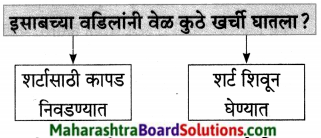
खालील प्रश्नांची एका वाक्यात उत्तरे लिहा.
प्रश्न 1.
मुलांच्या लक्षात काय आले?
उत्तर:
गंमत म्हणून सुरू केलेल्या खेळाला भलतेच गंभीर वळण लागल्याचे मुलांच्या लक्षात आले.
प्रश्न 2.
इसाबच्या वडिलांनी कुणाकडून पैसे कर्जाऊ घेतले?
उत्तर:
इसाबच्या वडिलांनी सावकाराकडून पैसे कर्जाऊ घेतले.
![]()
उतारा – पाठ्यपुस्तक पृष्ठ क्रमांक 48
केशव घुटमळला, पण ………………………
……………………………. इसाबने विचारले.
कृती 2: आकलन कृती
प्रश्न 1.
रिकाम्या जागा भरा.
1. अचानक अमृतला एक …………….. सुचली. (कथा / कल्पना / गोष्ट)
2. ……………. मुलांच्या पोटात गोळा आला. (भुकेने / तहानेने / भीतीने)
उत्तरे:
1. कल्पना
2. भीतीने
कोण कोणास म्हणाले ते लिहा.
प्रश्न 1.
“चल लवकर. काढ तुझा शर्ट. हा माझा शर्ट घाल.”
उत्तर:
अमृत इसाबला म्हणाला.
![]()
प्रश्न 2.
“पण तुझं, काय? तू काय घालणार?”
उत्तर:
इसाब अमृतला म्हणाला.
कृती 3: व्याकरण कृती
प्रश्न 1.
‘कार’ प्रत्यय लावून शब्द तयार करा.
उत्तरे:
कलाकार, आकार, ऊकार, बेकार, मोटरकार, सावकार, जाणकार
प्रश्न 2.
‘सावकार’ या शब्दातील अक्षरापासून अर्थपूर्ण शब्द लिहा.
उत्तरः
कार, काव, कासार, वर, वसा, राव, सावर, सारव
![]()
कृती 4: स्वमत
प्रश्न 1.
तुमच्या वर्गमित्राशी / वर्गमैत्रिणीशी झालेल्या भांडणाचा किस्सा नमुद करा.
उत्तरः
मी इयत्ता पाचवीत असताना माझ्या शेजारी पायल नावाची मैत्रीण बसत असे. आमची मैत्री होते असे वाटत असतानाच तिने माझ्यावर पेन्सिल चोरीचा आळ घेतला. पूर्ण वर्ग माझ्याकडे शंकेच्या नजरेने पाहत होता. शिक्षकांनी माझ्या बॅगेची तपासणी करता काही मिळाले नाही. मात्र खाली पडून दोन बेंच मागे सरकलेली ती पेन्सिल काही काळाने मिळाली. तिच्या या आरोपामुळे माझे व तिचे कडाक्याचे भांडण झाले होते. आम्ही अनेक महिने बोलत नव्हतो. मात्र आता आम्ही छान मैत्रीणी आहोत व तो किस्सा आठवून आम्ही आजही हसतो.
व्याकरण व भाषाभ्यास
प्रश्न 1.
खालील शब्दांतील अचूक शब्द लिहा.
1. कुश्ती, कूस्ती, कुस्ती, कुस्ति
2. सैरावेरा, सेरावैरा, सेरावेरा, सैरावैरा
उत्तरः
1. कुस्ती
2. सैरावैरा
![]()
प्रश्न 2.
खालील शब्दांचे लिंग ओळखून वचन बदला.
सण
झाड
कपडे
कल्पना
गंमत
उत्तरः
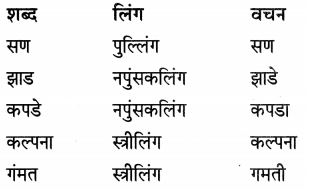
प्रश्न 3.
पुढील वाक्यात कंसातील योग्य वाक्प्रचार लिहा.
1. डोळ्यांसमोर झालेला भयानक अपघात बघून शारदाबाईंचे ………………… (पाय जमिनीला खिळले, आनंदावर विरजण पडले)
2. नवीन घरात पाऊल टाकताच अपशकुन झाल्याने सगळ्यांच्या …………………….. (आनंदावर विरजण पडले, वरचढ ठरले)
उत्तरः
1. पाय जमिनीला खिळले
2. आनंदावर विरजण पडले.
![]()
प्रश्न 4.
खालील वाक्प्रचारांचा अर्थ सांगून वाक्यात उपयोग करा.
1. वरचढ असणे: दुसऱ्यापेक्षा सरस असणे.
कबड्डी स्पर्धेत ‘अ’ गट ‘ब’ गटापेक्षा वरचढ ठरला.
2. चीत करणे: हरवणे.
आनंद विश्वनाथनने आपल्या प्रतिस्पर्ध्याला अत्यंत कमी वेळात चीत केले.
3. गळा दाटून येणे: मन भरून येणे.
लेकीची पाठवणी करताना शामरावांचा गळा दाटून आला.
लक्षात ठेवा:
मराठी शब्दातील शेवटचे अक्षर दीर्घ स्वरान्त असेल, तर त्याआधीच्या अक्षरातील इकार व उकार हस्व लिहितात. उदा. किडा, मेहुणा, पहिली, मनुका इ..
अपवाद – क्रीडा, परीक्षा, लीला, संगीता, पूर्व, भीती इ.
खालील वाक्यांत विरामचिन्हे घालून वाक्य पुन्हा लिहा.
प्रश्न 1.
अरे अमृत इसाब तुम्ही दोघं किती एक सारखे आहात
उत्तर:
“अरे, अमृत, इसाब! तुम्ही दोघं किती एकसारखे आहात!”
![]()
प्रश्न 2.
अरे तुम्ही दोघे कुस्ती का नाही लढत
उत्तरः
“अरे तुम्ही दोघे कुस्ती का नाही लढत?’
प्रश्न 3.
अमृत हरला केशव जिंकला केशव जिंकला हुर्ये हुर्ये
उत्तर:
“अमृत हरला, केशव जिंकला! केशव जिंकला! हुर्ये, हुर्ये!”
अदलाबदल Summary in Marathi
पाठ परिचय:
खऱ्या मैत्रीचे उदाहरण आपल्याला ‘अदलाबदल’ या पाठात लेखक पन्नालाल पटेल यांनी दाखवून दिले आहे. म्हणतात ना, ‘मैत्री ही नात्यापेक्षा कितीतरी श्रेष्ठ असते.’ अशाच अमृत व इसाब या दोघा मित्रांमधील अतूट मैत्रीचे वर्णन प्रस्तुत पाठात पाहायला मिळते.
The writer Pannalal Patel has shown an example of a real friendship through his write up ‘Adalabadal’. Friendship is much greater than any other relationship. This line has been proven in this write up through the friendship of Amrut and Esab.
शब्दार्थ:
- सायंकाळ – संध्याकाळ – evening
- मैत्री – सख्य – friendship
- व्रात्य – खोडकर – mischievous
- कुस्ती – दंगल – wrestling
- ताकद – जोम – strength
- वरचढ – प्रबळ, शिरजोर – predominate
- ठाम – निश्चित – firm
- भीती – भय – fear
- हट्ट – दुराग्रह – insistence
- मैदान – पटांगण – field
- पेच – गोंधळात टाकणे – puzzel
- गंभीर – चिंताजनक – critical
- सावकार – व्याजावर पैसे उसने देणारी व्यक्ती – lender
- कल्पना – युक्ती, विचार – idea
- नशीब – नियती – destiny
- धास्ती – भीती – fear
- झोंबाझोंबी – मारामारी – fighting
- खाट – पलंग (cot)
- ममता – प्रेम, ममत्व (affection)
- जनता – रयत, प्रजा (people of constituency)
- विनाकारण – कारणाशिवाय (without reason)
- पुरातन – प्राचीन (ancient)
![]()
वाक्प्रचार:
- गळ घालणे – आग्रह करणे
- पारा चढणे – खूप राग येणे
- चीत करणे – पराभूत करणे
- धास्ती वाटणे – भीती वाटणे
- हर्यो उडवणे – फजिती करणे
- सैरावैरा पळणे – स्वैरपणे पळणे, इकडे तिकडे पळणे
- हेलावून जाणे – भावना वेगाने दाटून येणे
- हातात हात घालणे – सहकार्याने वागणे
- पेच घालणे – डाव घालणे
- पोटात गोळा येणे – खूप भीती वाटणे
- आनंदावर विरजण घालणे – आनंद नासवणे
- गळा दाटून येणे – गहिवरून येणे
Marathi Sulabhbharati Class 7 Solutions
- आम्ही जाहिरात वाचतो Question Answer
- शब्दांचे घर (कविता) Question Answer
- वाचनाचे वेड Question Answer
- आम्ही बातमी वाचतो Question Answer
- पंडिता रमाबाई Question Answer
- लेक (कविता) Question Answer
- आपली समस्या आपले उपाय – २ Question Answer
- रोजनिशी Question Answer
- अदलाबदल Question Answer
- संतवाणी Question Answer
